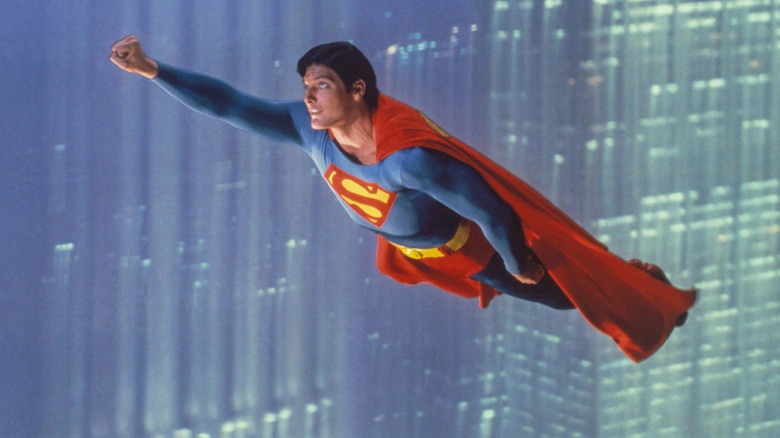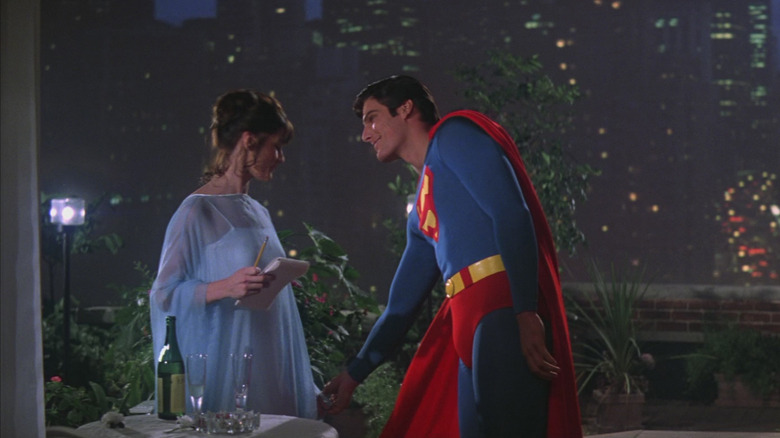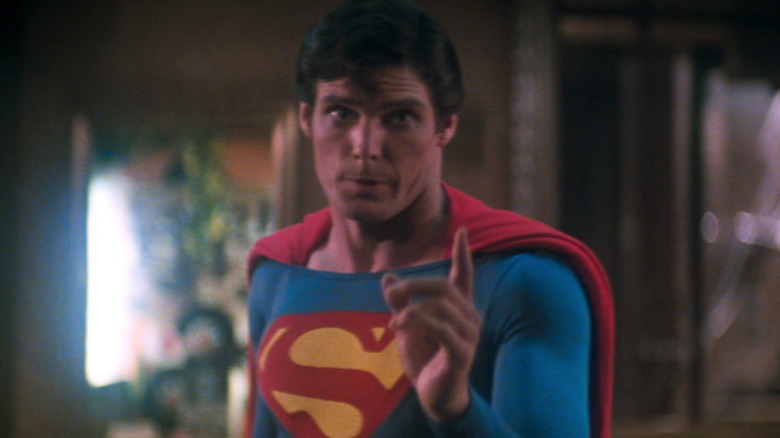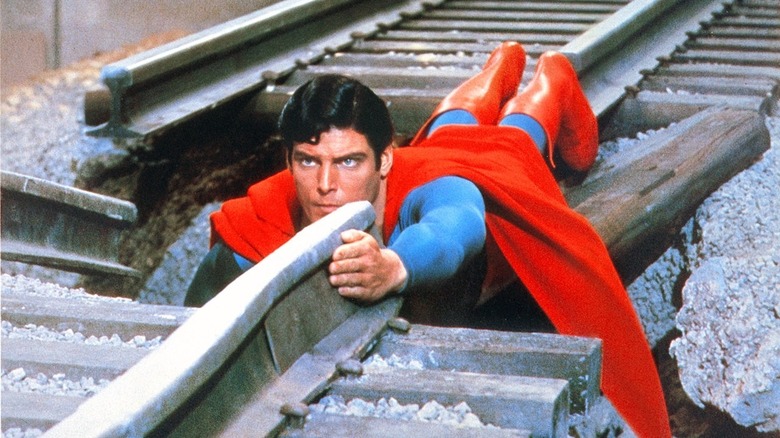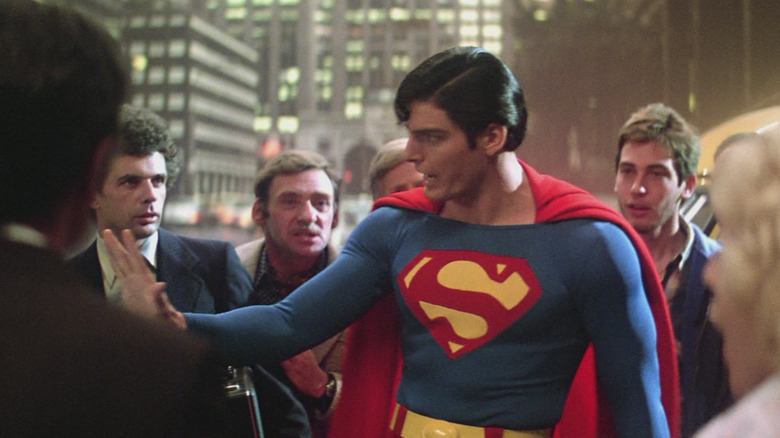How Richard Donner Salvaged Superman's Disastrous First Script
Richard Donner's 1978 film "Superman" remains, even at this late date, one of the best superhero films ever made (if not the best). Donner, with his glittering special effects, careful and deliberate storytelling style, and attention to Superman's do-gooder disposition, effectively captured the importance and enormity of a character who had, by 1978, leaked into the realm of Jungian archetypes. Multiple Superman movies have been made since, and few have approached the greatness of "Superman." As critic Scott Mantz once confided to this author, "Superman" is the Beatles of superhero cinema. At this very moment, you, dear reader, are likely humming John Williams' opening theme. "DUN Da-daah!"
It may even be fair to say that "Superman," while certainly not the first superhero movie, is certainly the first of the modern era. But, like any project of this scope ("Superman" had a budget of $55 million at the time, which is about $249 million in 2022 dollars), it was a bit of a mess from the studio side of things. Although the film was a hit — it grossed $134 million domestically (about $608 million in 2022) — it was not easy going for a single step of the way. Starting with the script, eventually credited to Mario Puzo.
In a 2016 "Superman" retrospective that the Hollywood Reporter did with Richard Donner, the director revealed how Alexander Salkind, the film's producer, brought him on in quite a hurry, paid him an embarrassing amount of money, and gave him a script that was thick enough to anchor a ship. It would be Donner's job to find a movie in that script somehow.
'I'll pay you a million dollars'
Right before being brought on to "Superman," Donner recalls, he was riding a crest in his career. He had just come off directing "The Omen," a large hit for the studio, and had officially broken out. Perhaps embarrassingly, when Salkind came calling, he didn't know who he was. But he was immediately enticed by the paycheck.
"I was hot. It was just a high point in my life, because I had done a lot of TV and then 'The Omen.' I was getting a lot of calls and I had no idea where I was going. And then I got this call from Alexander Salkind. He said, 'Do you know who I am?' and I said, 'No. Why are you calling me?' He said, 'I'll get to that. I'm a producer. Did you ever see "The Three Musketeers?'" I said I did see it, and he said 'I produced that.' And I said, 'The way I hear it, they tried to release a second picture without paying the actors.' He said, 'Well, that's a long story. I'm making "Superman." I don't have a director and I'll pay you a million dollars.'"
Donner gleefully accepted. Knowledgeable enough to be aware of multi-picture deals, he asked if he would also be on the hook for a sequel. The answer was yes, which was fine. Salkind also said that Marlon Brando was involved for a few days of shooting, and Gene Hackman was also in it. Perhaps a little alarming to Donner was that shooting was set to begin pretty darn soon after that phone call. Donner recalls asking Salkind how the script was, and Salkind describing it as "perfect."
The script, Donner recalls, was not perfect.
Who loves ya, baby?
Soon after Donner hung up with Salkind, he received a package containing a Superman suit and a script — a long, long script. "Superman" is already notoriously long — it runs 143 minutes — but it seems it was once intended to be longer. It was also, to Donner's recollection, quite bad.
"There was a delivery guy at my door within an hour, with this script that was so thick and big you'd get a hernia from lifting it. And there were other things with [the package], and one of them was the Superman costume. So I sat down and read the script, and it took forever. It was the longest thing I have ever read. It was indulgent and heavy and had no point of view and treated [the comic books] with disrespect."
Donner even remembers — and this may sound apocryphal, but could very well be true — a comedic cameo was written into the script ... for Kojak. Yes, Telly Savalas, in character as Kojak (the title character from a hit TV detective show that ran from 1973 until 1978), was going to make a winky reference and even lay down his catchphrase. Donner was grossed out:
"It was disparaging. It was just gratuitous action. I'm reading this thing and Superman's looking for Lex Luthor in Metropolis, and he's looking for every bald head in the city. And then he flies down and taps a guy on the shoulder and it's Telly Savalas, who hands him a lollipop and says, 'Who loves ya, baby?'"
Yeah. Gross.
Getting high and dressing as Superman
Donner, in THR article, says that he — along with a whole generation — was raised on Superman. Indeed, one might say adult Superman fans in the 1970s were the first generation of adults to have had Superman as their hero (the character debuted in 1938, with TV mega-hit "The Adventures of Superman" following in 1952). Donner wanted to make the move just so he could save it from the awful script he just read. Donner called up a screenwriter friend of his and, uh, altered his consciousness so the two of them could make heads or tails of this awful script together. Oh yes, and he put on the suit.
"I called Tom Mankiewicz, who had been a friend for years. He said, 'I don't want to get involved. I don't want to do a comic book.' I said, 'Tom, it's more than a comic book. Please come over.' I got a little stoned, smoked some weed, put on the Superman costume. I was in pretty good shape then. It was like elastic. And Tom pulled up, and I ran across the lawn and Tom turned and looked at me and ran back to his car. Tom says, 'You're crazy. Get the f*** away from me!"
Donner was able to talk Mankiewicz down, however, and even convinced him to take a script home to give it a once-over. Even while high and while dressed as Superman, Donner was convincing.
Money arguments in Paris
Donner's amusing anecdote became more down-to-Earth after the Superman suit moment, and he was able to open up about what this script might need, and how the brick he just read could perhaps be made into something interesting.
"'Tom, listen. You've got to read this.' I gave him all my feelings about what we should do. I said, 'The most important thing when you look at it is this: Make a love story. And prove a man can fly.' So he read it and he called me that night and said, 'You know, there's a lot we can do with this.'"
It should be noted that neither Donner nor Mankiewicz are credited screenwriters on "Superman." After figuring out a lot about what needed to be done the script, Donner met up with Salkind — in Paris — to tell him that he wouldn't make "Superman" without a major overhaul to the "perfect" script. Salkind, fond of the perfect draft, balked:
"The first thing I said was, 'Mr. Salkind, this needs a major rewrite.' He said, 'No ... this is a perfect script.' I said, 'It's not a perfect script.' So I started telling him all my feelings and he said, 'You're wrong.' I said, 'Thank you for the trip to Paris, but I can't do this.' And we started leaving. He said, 'OK, tell me what you would rewrite.' Then we had some money arguments and Steve and I walked out, went back to our hotel."
Yeah, Salkind immediately called Donner back at the hotel and agreed. A good thing he did, because Donner's film turned out glorious. Donner took a "perfect" script and turned into something that approaches perfect.
Eventually, we all believed a man could fly. All because Donner couldn't believe the script.
